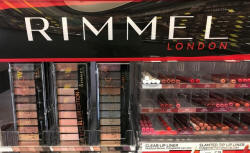Luxury brands lifted by EU court backing for online
sales ban
 Send a link to a friend
Send a link to a friend
 [December 06, 2017]
By Foo Yun Chee [December 06, 2017]
By Foo Yun Chee
LUXEMBOURG (Reuters) - Coty and other
luxury brands scored a landmark victory on Wednesday in their bid to
stop retailers selling their products on online platforms such as Amazon
<AMZN.O> and eBay <EBAY.O> when Europe's top court backed their right to
protect their image.
The issue is significant in Europe, whose companies account for 70
percent of global luxury goods sales. Luxury owners have long waged a
battle against what they see as free riders cashing in on their
exclusivity and branding.
Online platforms such as Amazon and eBay, in turn, say online sales
curbs are anti-competitive and hurt small businesses.
The Court of Justice of the EU (ECJ) ruling came in a case involving
U.S. cosmetics maker Coty's <COTY.N> German subsidiary and German
retailer Parfumerie Akzente, which sells Coty's goods on sites including
Amazon against the company's wishes.
A German court had sought guidance on whether banning online sales on
third-party sites restricted competition.

"A supplier of luxury goods can prohibit its authorized distributors
from selling those goods on a third-party internet platform such as
Amazon," the ECJ said.
"Such a prohibition is appropriate and does not, in principle, go beyond
what is necessary to preserve the luxury image of the goods."
Coty, whose brands include Marc Jacobs, Calvin Klein and Chloe, welcomed
the ruling, which carries legal weight across the 28-nation EU.
"After years of uncertainty, this means luxury brands can determine how
they are placed on digital platforms and it is a clear ruling for the
protection of luxury brands' image, the defense of our teams' work and
the protection of consumers' rights and information," the company said.
Parfumerie Akzente said it meets the terms for online sales set by
luxury owners.
"Authorized merchants such as us may sell brand-name products on
outward-visible third-party platforms, provided that we meet the
conditions that are necessary and reasonable for preserving the luxury
image," Chief Executive Kai Renchen said in a statement.
[to top of second column] |

Rimmel cosmetics owned by Coty Brands are shown for sale in a retail
store in Encinitas, California, U.S., November 8, 2017. REUTERS/Mike
Blake

Amazon declined to comment.
After intense lobbying by LVMH <LVMH.PA>, Richemont <CFR.S> and other luxury
goods companies, EU antitrust regulators laid down rules in 2010 allowing brand
owners with less than a 30 percent market share to block online retailers
without a bricks-and-mortar shop from distributing their products.
The issue has split EU countries, with Germany more eager to promote e-commerce.
In two test cases in recent years, the German cartel office forced Adidas <ADSGn.DE>
and Asics <7936.T> to drop such bans, saying online platforms are crucial for
small- and medium-sized companies and consumers.
The German cartel office said it expected the court's ruling to have a limited
effect on its policy, noting that its decisions had involved brand manufacturers
from outside the luxury industries.
"Our preliminary view is that such manufacturers have not received carte blanche
to impose blanket bans on selling via platforms," the office's president,
Andreas Mundt, said in a statement.
Germany will now have to fall in line though, said a competition lawyer, who
declined to be named.
"This judgment sets the principles for the EU as a whole. Germany will have to
align with European case law and accept this kind of restrictions unless it
contradicts some conditions in competition law," he said.

The case is C-230/15 Coty Germany.
(Reporting by Foo Yun Chee; editing by Philip Blenkinsop and Adrian Croft)
[© 2017 Thomson Reuters. All rights
reserved.] Copyright 2017 Reuters. All rights reserved. This material may not be published,
broadcast, rewritten or redistributed. |